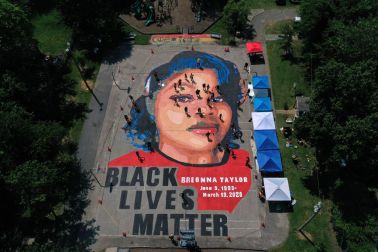
Source: Patrick Smith / Getty
A startling new Washington Post report shows that since 2015, almost 250 women in America have been fatally shot by police. But Black women account for 20 percent of the killings and 28 percent of the unarmed deaths, despite making up only 13 percent of the women population in the U.S.
The study, released Friday, is an extension of The Washington Post’s Fatal Force database which tracks the number of police shootings in America. The outlet began collecting fatalities in 2015 as a means to provide data after discovering there was a lack of information regarding the numbers. Since the database began, over 5,000 fatal police shootings have occurred.
But Breonna Taylor‘s death also served as a turning point in the necessity of looking at how state sanctioned violence enacted by law enforcement, affects Black women in particular. The report finds that police have fatally shot 247 women since 2015. Of that number, 48 were Black women. And like Taylor, of the 247, seven were unarmed while 89 were killed at homes or residences they frequented.
Taylor’s case is still gaining momentum as her family continues to advocate for justice on her behalf. Unfortunately, her six month death anniversary looms with no arrests or indictments. Taylor’s death was compounded between the collective grieving of two Black men, Ahmaud Arbery and George Floyd.
Black men are killed more frequently by the police according to the Post’s data. While they only make up 12 percent of the male population, Black men comprise 27 percent of the men shot and 36 percent of the unarmed deaths.
But Black women have their own concerns when it comes to interactions with law enforcement, based on many outlying factors intertwined with continued health disparities, and America’s history of sexual violence against Black women.
The thread begins long before Black women are adults. Several reports have shown that Black women are disciplined at higher rates than their peers, and are often to be considered older than their actual age.
Criminal justice experts believe the numbers can be attributed to the fact that officers often don’t see women as threats to safety in the same way men are viewed. But when women act outside of the confines of “social norms” they are more often met with excessive force, especially in regards to Black and LGBTQ women.
Black women are also susceptible to sexual violence at the hands of police, as was shown in the case of former officer Daniel Holtzclaw, who was found guilty of rape and sexual battery involving eight women. He was sentenced to 263 years in prison in 2016.
Black women writers, researchers and advocates like Andrea Ritchie and Kimberle Crenshaw, who coined the terms intersectionality and the #SayHerName rallying cry used for Black women like Taylor also weighed in on the report’s findings. Ritchie and Crenshaw are both lawyers who have decades of experience in examining the ways misogynoir permeates into the cases of Black women killed by police.
“There’s definitely a long history of framing women who aren’t compliant as insane,” said Ritchie, author of “Invisible No More: Police Violence Against Black Women and Women of Color.”
“I think that’s particularly true for Black women.”
There are many examples that show officers are more likely to react negatively when called to de-escalate incidents where a woman may be suffering from a mental break or mental illness. The 2016 NYPD shooting of Deborah Danner, after she wielded a knife toward police called to her home for a wellness check, was also a case that highlighted the need for specific deescalation training based on the victim’s mental health state.
“As long as Black women lose their lives in circumstances like these, their lost life won’t be dramatized in a way that mobilizes the kinds of reforms that have to happen in order to protect more life and to make police officers accountable,” said Crenshaw.









